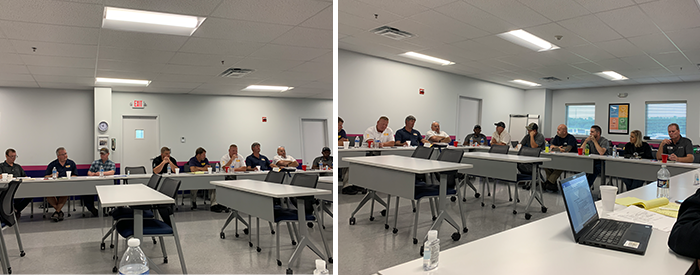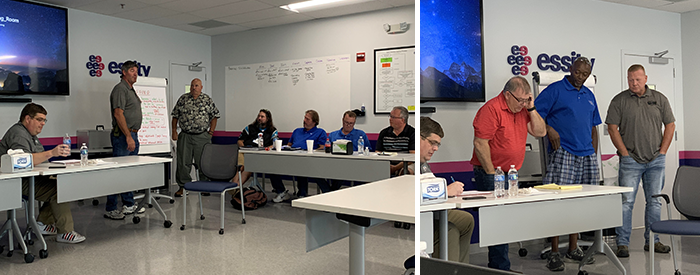Monday Morning Minute: Aug. 22, 2022
Union Work
Packaging Corporation of America (PCA) Box Locals Ratify New Master Agreement
The local unions representing approximately 1,800 USW bargaining unit members at 25 PCA box shops ratified a new Master Agreement on Aug. 18. The agreement includes the best-in-industry overall wage pattern, preserves our members industry-leading healthcare plan with no changes for an additional six years, achieved additional weeks of vacation for many of the sites, and also provides a platform that will be used as the model for bargaining with the industry moving forward.
The former Box Master was set to expire in 2023; however, the company approached the USW about bargaining the new Master Agreement one year early as a means of recognizing the hard work that our members have put in through the pandemic and immediately addressing attraction and retention issues around hiring and staffing. Congratulations to the PCA Box Council!
Essity Joint Advisory Committee Meeting
USW Locals 1535, 1-112, 1478, 1241, 324 & 2-1279 – Essity – Barton, AL; Middletown, OH; South Glens Falls, NY; Danville, KY; Menasha, WI, Neenah, WI & Greenwich, NY
On Aug. 17-18, the Essity Council held its Joint Advisory Committee (JAC) Meeting at the Barton, Ala., tissue mill for the first time in-person since the pandemic began.
Established through master negotiations, the JAC seeks to meet regularly, twice per year, to review the state of the company’s business and discuss key issues across the USW-represented sites. The intent is for the union and company to collaboratively develop, implement and support operational improvements within each facility that result in improved market competitiveness and work life experience for our members.

A union-only session was held prior to the joint meeting, which allowed local leaders to talk about common issues across the sites to prioritize during open discussion with the company. Like other paper sector councils, staffing and attraction/retention issues are at the top of the list to be addressed, and the group ended with a commitment from both sides to conduct market wage analyses to identify classifications that need wage adjustments as well as to work together to determine appropriate staffing levels at each site. Photos from the union-only session are below.

Regional focus group sessions were also held to work out issues at the individual site-level. Each group then reported out on their site’s plan to address those issues. Photos of the groups from South Glens Falls, N.Y. (USW Local 1478) and Middletown, Ohio (USW Local 1-112) can be seen presenting the findings from their respective breakouts.
The meetings concluded with a tour of the Barton, Ala., mill, which produces napkin, bath and towel tissue for the away-from-home market. It is also the only tissue mill in the United States that produces coreless toilet paper rolls. The sites converting lines are shown below.
Safety
Reliability and Safety – The Link Between Personnel Safety and Equipment Reliability – From the Technical Association of the Pulp and Paper Industry
The Technical Association of the Pulp and Paper Industry recently wrote a two-part article on the important role that equipment reliability can play in safety. The article suggests that, when the plan is operating efficiently, the risk of hazard exposure should be reduced. It also insinuates that people are invariably fallible, meaning they are going to make mistakes, and when these mistakes occur, the severity of the resulting incident should be mitigated as much as possible.
According to a 2015 study conducted by the University of Tennessee Reliability and Maintenance Center, workers at the companies that are performing the highest percentage of reactive (unplanned and unscheduled) work suffer recordable injuries at rates four times higher than companies in the middle of the pack and 40 times higher than companies that minimize reactive maintenance work. These “Top 25” companies reduce reactive maintenance work through both effective planning and scheduling and effective Preventive Maintenance/Essential Care and Condition Monitoring.
Workers don’t go into a job thinking that whatever injury is about to occur would ever happen to them. The companies that have the most success in this area embrace human error, learn from incidents that occur, and look to build a safer workplace where they can fail safely (when they inevitably fail). The field of study dedicated to these types of issues is called Human and Organization Performance (HOP); it has the following primary tenets:
- Error is normal
- Blame fixes nothing
- Systems drive behavior
- Learning from incidents is vital
- Response matters
Responses to safety incidents should focus on the condition of the injured parties and/or equipment condition, then on the circumstances surrounding the incident and the potential for the incident to recur, rather than ignoring vital information and focusing on who to blame or discipline. Systems should also be implemented that will allow the equipment or workers to reach a safe state before catastrophic failure occurs.
Within the USW paper sector, many companies have committed to using a HOP-based approach to safety and are engaging the union at many levels around its implementation.
Industry Update
Research Suggests that We Make a More Virtuous Choice When Using Pen and Paper
New Harvard research suggests that, when decisions feel more real, we act more virtuously, but trends toward digitization counter that process. Harvard conducted a series of studies with more than 2,500 participants across the U.S. and China to explore the impact of the medium you use to make a decision, with a particular focus on decisions with some sort of moral component, such as whether or not to make a donation to charity, or whether to choose a healthy or unhealthy entrée at a restaurant.
Participants either used a paper form or digital tablet to make a variety of choices and, despite controlling for all other variables, researchers consistently found that people who used paper made more-virtuous decisions than those who used a digital device.
The key mechanism driving this effect of how “real” the decision feels is whether paper or a digital device is used. Participants were asked to describe how tangible a decision felt, as well as the extent to which they perceived the decision as representing who they were as people, and they consistently indicated that making a choice on paper felt more real and representative than making the same decision on a digital device.
When paper is an option, the research suggests that it can be an effective way to make a decision feel more real and representative of the decision-maker as a person, ultimately increasing the chances that they’ll make a virtuous choice. It’s another example of the significance and value of the products that USW paperworkers make.
Tell Us Your Stories!
Has your local done something amazing? Have you had a great solidarity action? Done something huge to help your community? Made significant connections with other labor groups? Is your Women of Steel or Next Gen committee making waves? Have you had success in bargaining, major accomplishments? We all stay so busy working to improve our workplaces and communities that we often do not take 5 minutes to reflect, share and celebrate our accomplishments.
Tell us your story so we can all be part of it! Contact Laura Donovan at ldonovan@usw.org, or at 412-562-2504.
